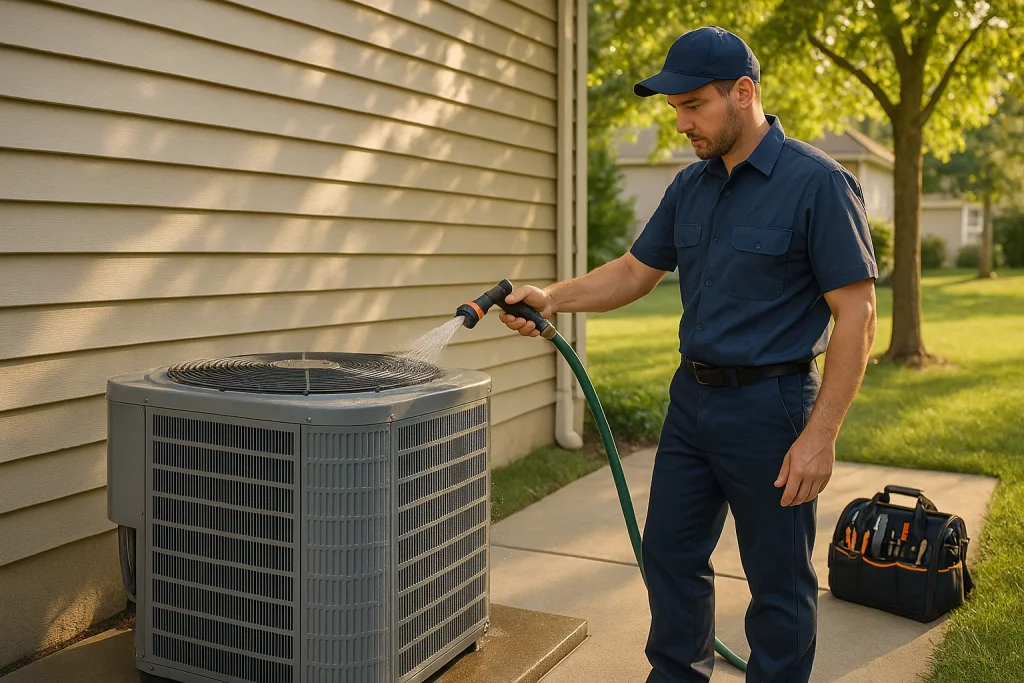In Wallace, where wide-open spaces, farm fields, and tree-lined roads are part of daily life, homeowners enjoy the charm and peace of rural living. But with all that beauty comes an often-overlooked downside: increased exposure to dust, pollen, and yard debris—all of which can quietly damage your air conditioning system.
A clean, well-maintained system runs more efficiently, lasts longer, and is far less likely to break down when you need it most. Learn practical maintenance tips to protect your AC system from the effects of rural dust and debris.

Why Rural Homes Are Tougher on HVAC Systems
Compared to more urban settings, homes in rural areas like Wallace are more prone to:
- Dust and dirt kicked up from gravel driveways, farm equipment, and dry soil
- Pollen from surrounding vegetation and seasonal crops
- Grass clippings and leaves from regular yard maintenance
- Animal dander and insects that can enter outdoor units or ductwork
These airborne particles don’t just dirty your home—they get sucked into your HVAC system, reducing airflow, lowering efficiency, and increasing wear on essential components.
1. Clean or Replace Your Air Filter
In dusty environments, your air filter works overtime. A clogged filter forces your AC to work harder and can lead to frozen coils or overheating.
Tip: Check your air filter monthly and replace it at least every 30–60 days during peak cooling season. If you’ve been doing any landscaping, harvesting, or heavy mowing nearby, check it more often.
2. Clear the Area Around Your Outdoor Unit
Your outdoor condenser needs room to breathe. Grass, weeds, and overgrown shrubs can restrict airflow, while yard debris like twigs, dust, and leaves can build up inside the unit. What to do:
- Keep at least two feet of clear space around the unit
- Trim plants and remove weeds
- Gently rinse the fins with a garden hose to remove dirt buildup (never use a pressure washer)
3. Inspect the Condenser Coils
Condenser coils are responsible for releasing heat from your home. When coated in dust and debris, they can’t do their job properly, and your system becomes inefficient or may overheat.
Best practice: Schedule a professional coil cleaning at the end of summer. We’ll carefully clean the coils and inspect for signs of wear or corrosion.
4. Seal and Clean Ductwork
Dust doesn’t just affect your outdoor unit—it finds its way inside too. If your ductwork has leaks or isn’t sealed properly, it can suck in debris from attics, crawlspaces, or nearby fields.
Solution: Ask us about a duct inspection and cleaning service. We’ll check for leaks, seal gaps, and remove built-up dust that’s circulating through your home.
5. Protect Against Pest Intrusion
Insects, mice, and birds often seek shelter in warm, enclosed areas, such as your AC unit or vents. Late summer is the time when many critters start scouting for shelter ahead of fall. Prevention tips:
- Check outdoor unit covers and screens for damage
- Seal gaps around ductwork or utility penetrations
- Keep mulch and food sources away from the unit
Regular upkeep not only preserves your AC’s performance but also helps maintain healthy indoor air quality, especially in areas where airborne particles are common.
At Gideon Heating & Air Conditioning, we like to say that our work isn’t just good—it’s Gideon Guaranteed! Contact us today to schedule AC maintenance.
